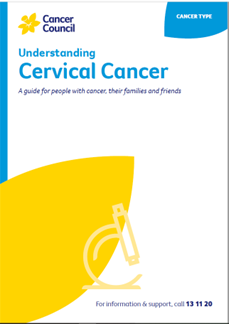- Home
- Cervical cancer
- Symptoms
Cervical cancer symptoms
Precancerous cervical cell changes usually have no symptoms. The only way to know if there are abnormal cells in the cervix that may develop into cancer is to have a cervical screening test.
Cervical cancer symptoms may include:
- vaginal bleeding between periods, after menopause, or during or after sexual intercourse
- pelvic pain
- pain during sexual intercourse
- a change to your usual vaginal discharge (e.g. there may be more discharge or it may have a strong or unusual smell or colour).
Any of these symptoms can happen for other reasons, but it is best to rule out cervical cancer. See your general practitioner (GP) if you are worried or the symptoms are ongoing. This is important for anyone with a cervix – whether heterosexual, lesbian, bisexual, transgender or someone with an intersex variation – even if you are up to date with cervical screening tests.
Learn more about how cancer and its treatment can affect LGBTQI+ people.
→ READ MORE: Screening for cervical cancer
Podcast for people affected by cancer
Listen now
More resources
Prof Martin Oehler, Director of Gynaecological Oncology, Royal Adelaide Hospital, and Clinical Professor, University of Adelaide, SA; Dawn Bedwell, 13 11 20 Consultant, Cancer Council QLD; Gemma Busuttil, Radiation Therapist, Crown Princess Mary Cancer Centre, Westmead Hospital, NSW; Dr Antonia Jones, Gynaecological Oncologist, The Royal Women’s Hospital and Mercy Hospital for Women, VIC; Angela Keating, Senior Psychologist, Royal Hospital for Women, NSW; Anne Mellon, Clinical Nurse Consultant – Gynaecological Oncology, Hunter New England Centre for Gynaecological Cancer, NSW; Dr Inger Olesen, Medical Oncologist, Andrew Love Cancer Centre, Barwon Health, Geelong, VIC; Dr Serena Sia, Radiation Oncologist, Fiona Stanley Hospital and King Edward Memorial Hospital, WA; A/Prof Megan Smith, Co-lead, Cervical Cancer and HPV Stream, The Daffodil Centre, Cancer Council NSW and The University of Sydney, NSW; Emily Stevens, Gynaecology Oncology Nurse Coordinator, Southern Adelaide Local Health Network, Flinders Medical Centre, SA; Melissa Whalen, Consumer.
View the Cancer Council NSW editorial policy.
View all publications or call 13 11 20 for free printed copies.



